Experts from business and academia say that despite unprecedented challenges, the SAR always rebounds.
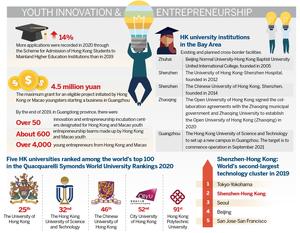
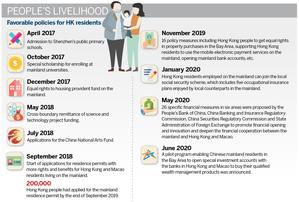

July 1, 2017
President Xi Jinping oversees the signing of the Framework Agreement on Deepening Guangdong-Hong Kong-Macao Cooperation in the Development of the Bay Area.
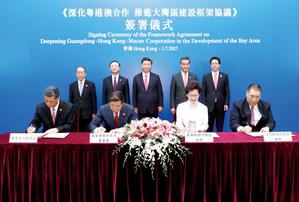
Sept 23, 2018
The Hong Kong section of the Guangzhou-Shenzhen-Hong Kong Express Rail Link goes into operation.
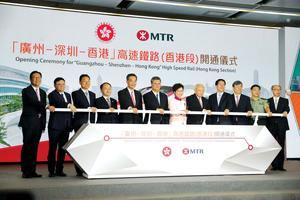
Oct 24, 2018
The Hong Kong-Zhuhai-Macao Bridge, the world’s longest sea crossing link, opens to the public.
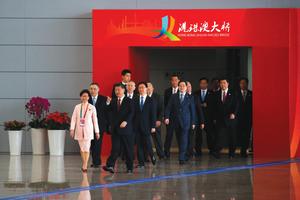
Feb 18, 2019
The central government unveils its blueprint for the Bay Area’s development plan.
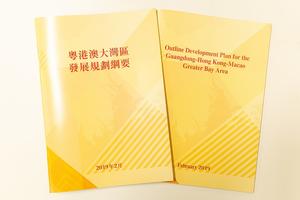
July 5, 2019
Guangdong provincial authorities issue a three-year action plan for the Bay Area from 2018 to 2020, together with an official document that outlines key events for the province to accomplish for advancing the Bay Area development in the coming decade.
Nov 6, 2019
The central government unveils 16 favorable policies for Hong Kong.
May 14, 2020
A financial support guideline for the development of the Guangdong-Hong Kong-Macao Greater Bay Area is issued.
June 30, 2020
The law on safeguarding national security in the HKSAR of the People’s Republic of China is passed and promulgated.
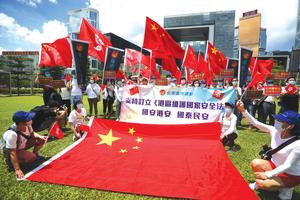
Tech prowess paves the way to a brighter future
Luo Weiteng in Hong Kong
Hong Kong’s reunification and integration with the motherland has been intertwined with the nation’s technological achievements, and will make a magnificent story of a bright tech future, says Hong Kong academic Wong Yuk-shan, and leading scientist Chan Ching-chuen.
“Since the handover 23 years ago, Hong Kong and the Chinese mainland have been on the fast track of development in terms of scientific research and technological application,” Wong, president of the Open University of Hong Kong, told China Daily.
“China’s meteoric rise as a technology powerhouse is definitely a boon for Hong Kong. Technological advancement cannot go without exchanges and collaboration. In the past two decades, the mutually beneficial cooperation between the mainland and the SAR has been a real eye-opener to the city’s tech circle,” said Wong, who is also a Hong Kong deputy to the National People’s Congress and member of the Hong Kong Basic Law Committee.
Closer ties with the mainland has enabled Hong Kong people to join hands with their mainland peers in a constellation of research projects and reap the rewards of cooperation, he said.
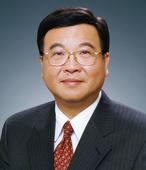 Wong Yuk-shan. (PHOTO PROVIDED TO CHINA DAILY)
Wong Yuk-shan. (PHOTO PROVIDED TO CHINA DAILY)
In academic collaboration, Wong noted that many mainland postgraduates have come to the SAR in pursuit of their scientific endeavors, helping to cultivate a deep pool of top-caliber, tech-savvy professionals for the city.
Hong Kong universities have also been heading north, setting up campuses and research centers, particularly in the Guangdong-Hong Kong-Macao Greater Bay Area. The Chinese University of Hong Kong’s Shenzhen campus was established in 2014.
Wong believes innovation and technology will be Hong Kong’s next growth engine that will help the city wean off its years-long over-reliance on traditional industries like financial services and real estate.
With the aim of creating an innovation cluster to rival the likes of the Silicon Valley in the Bay Area, Hong Kong is set to write a new chapter in its development since reunification, he reckoned.
Deeper bilateral collaboration is underway. The Hong Kong University of Science and Technology will soon open its campus in Guangzhou, confident of building up a talent pool in interdisciplinary research. The Open University of Hong Kong, according to Wong, will also launch its own campus in Zhaoqing.
“The combination of technology, policy, market and finance is the winning formula for success,” said Chan Ching-chuen, Hong Kong’s first academician of the Chinese Academy of Engineering.
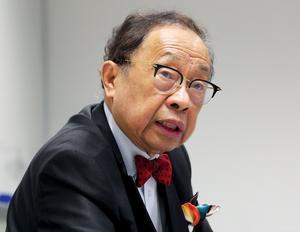 Chan Ching-chuen. (PHOTO PROVIDED TO CHINA DAILY)
Chan Ching-chuen. (PHOTO PROVIDED TO CHINA DAILY)
“Hong Kong’s competitive edge lies in finance and universities, but the financial hub has long been restricted by a lack of research centers, a vast market and large enterprises,” said Chan, who also serves as founding president of the World Electric Vehicles Association and an honorary professor at the Department of Electrical and Electronic Engineering of the University of Hong Kong.
“This speaks volumes about how Hong Kong and the mainland cities in the Bay Area could draw on each other’s strengths and jointly develop a knowledge-based economy,” he stressed.
Wong said a knowledge-based economy will offer a diversity of occupations for Hong Kong’s young people, who mostly go after plum jobs in the well-paid financial services, healthcare and legal sectors.
“This is totally different from the past. In the 1950s and 1960s, the best graduates of my generation, with simple and pure love for their homeland, a sense of duty and a willingness to serve the country, always sought to work in the science and technology field,” he recalled. “It’s a fairly simple, but society-wide idea to devote our expertise and know-how to the technological advancement of a stronger, more prosperous motherland, without giving much thought to how much we could earn.”
“However, through favorable policies, government initiatives and in-depth integration with the mainland, I think this will all change. Our young people will rekindle their interest in innovation and technology, and rediscover their passion for contributing to the motherland,” said Wong.
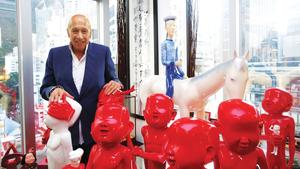 Allan Zeman. (PHOTO PROVIDED TO CHINA DAILY)
Allan Zeman. (PHOTO PROVIDED TO CHINA DAILY)
Handover a new beginning for the city’s prosperity
By Edith Lu in Hong Kong
The sky opened up on June 30, 1997.
“It was pouring, probably one of the heaviest downpours I’ve ever seen,” recalled business tycoon Allan Zeman.
It was a momentous occasion and a day to remember for Zeman, whose name is synonymous with Hong Kong’s famed nightlife spot Lan Kwai Fong, located in the heart of the city’s central business district.
He was on a selected list of the local political and business elite invited to the solemn ceremony at the stroke of midnight to herald the transfer of Hong Kong back to the People’s Republic of China after 156 years of British rule.
As the then-British colonial government held a farewell ceremony out in the open at Tamar a few hours before the historic ceremony, the rain started lashing the city relentlessly. Zeman found himself completely soaked.
He was then ushered into the posh Hong Kong Convention and Exhibition Centre in Wan Chai, which was specially built for the occasion and would later become the city’s iconic landmark that draws visitors by the score each year, the bulk from the Chinese mainland.
As the clock ticked toward the handover, the national flag of the United Kingdom and Hong Kong’s British colonial flag were slowly lowered. At the stroke of midnight, the national flag of the People’s Republic of China, as well as the new Hong Kong regional flag, were hoisted, symbolizing the country’s resumption of exercise of sovereignty over Hong Kong.
“It’s something very special in my heart that I’ll never forget. I was very fortunate indeed to be present to watch this historic moment,” said Zeman. “It’s like something in a history book.”
The handover was also witnessed by hundreds of journalists from all over the world. They came to interview Zeman — a Canadian-born Hong Kong businessman with deep roots in the city — seemingly worried it would be the end of Hong Kong’s prosperity.
“I kept saying ‘no’. I told them I know China and I know how fast it’s developing — this is only a new beginning,” said Zeman.
Under the “one country, two systems” principle and through an individual visit scheme, businesspeople and tourists from the mainland can visit the SAR on an individual basis — a tremendous boost for the local economy with the hospitality, retail and travel-related industries reaping the lion’s share of the financial bonanza.
“Hong Kong’s economy saw enormous growth as mainland tourists swarmed into the territory, lifting the fortunes of businesses here, particularly, tourism, retail and food and beverage,” said Zeman.
This year marks the 23rd anniversary of the handover — a tumultuous year for Hong Kong, which has seen 12 months of social unrest on top of strained relations between the world’s two largest economies.
“Hong Kong has gone through a huge rift, starting from last year. The protests have really destroyed our brand name. The trade spat between China and the US has made Hong Kong the ham in the middle of the sandwich,” lamented Zeman.
The tycoon believes the national security law for Hong Kong will put the city back on track and win back the trust that was lost. Hong Kong people will also be able to strengthen their sense of national identity and pride.
Zeman has lived in Hong Kong for almost half a century. He renounced his Canadian citizenship and adopted Chinese nationality in 2008.
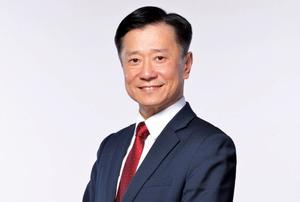 Yiu Si-wing. (PHOTO PROVIDED TO CHINA DAILY)
Yiu Si-wing. (PHOTO PROVIDED TO CHINA DAILY)
Tourism — together we overcome and rebuild
By He Shusi in Hong KongHong Kong is no stranger to dealing with financial dilemmas. It has gone through thick and thin, overcoming crisis after crisis in the past several decades.
The coronavirus onslaught has brought much pain to the city’s business and social life. Tourism, as one of Hong Kong’s pillar industries, has had more than its fair share of the suffering, already battered by a year of social turmoil.
But upon the 23rd anniversary of the special administrative region’s return to the motherland, industry heavyweights have held their heads high, convinced that the sector is reassured of a promising future and will see a spectacular rebound under the successful implementation of “one country, two systems”.
The much-awaited national security law for the SAR is expected be another catalyst for restoring peace and order, and ensuring a stable environment for economic progress, especially for tourism, they said.
Hong Kong’s tourism business has been on a roll since the handover in 1997, especially after 2003 when tourists from the Chinese mainland were allowed to visit the SAR on an individual basis, noted Lo Sui-on, director and honorary chairman of China Travel Service (Hong Kong) — the first mainland-run travel agency set up in the SAR and now one of the largest travel institutes in the city.
Prior to the social unrest that broke out in mid-June last year, the city hosted more than 650 million visitors in 2018, topping the world charts in terms of tourist numbers to any single destination within a specified period.
In 2018, tourism accounted for 4.5 percent of Hong Kong’s gross domestic product, with close to 80 percent of the visitors coming from the mainland.
Lo, who’s also a Hong Kong deputy to the National People’s Congress — the nation’s top legislature — said the steady development of “one country, two systems” has ushered in a “golden age” for the SAR’s tourism industry, driving the growth of the retail, hospitality, transport and catering sectors and creating more than 800,000 jobs — more than 20 percent of the local labor force.
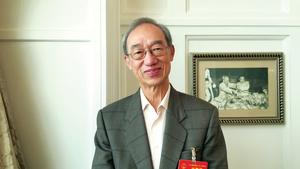 Lo Sui-on. (PHOTO PROVIDED TO CHINA DAILY)
Lo Sui-on. (PHOTO PROVIDED TO CHINA DAILY)
While the protest violence has dealt a heavy blow to tourism, Lo believes the implementation of the national security law for Hong Kong will effectively help restore peace and order in the city.
Confident about the city’s political situation in the long run, he stressed that stability will create a conducive environment for tourism.
However, he said Hong Kong still has a lot to do to rebuild its reputation as a popular international travel destination that has been tarnished by the unrest. The task of promoting Hong Kong tourism in the global market and restoring the city’s hospitality, especially among mainland travelers, is paramount, he stressed.
Lo would like the SAR government to take the lead in promoting local residents’ awareness of the importance of tourism to Hong Kong’s economic development, and make them feel it’s vital to attract visitors by showing their hospitality.
China Travel Service (Hong Kong) Chairman Yiu Si-wing, who represents the tourism sector in the Legislative Council, hailed the central government’s unwavering support for the SAR’s tourism sector, notably the Individual Visit Scheme and the Mainland and Hong Kong Closer Economic Partnership Arrangement, enabling the tourism business to make an enormous contribution to the SAR’s economic growth in the past 23 years.
Noting that the COVID-19 outbreak might continue for a year or two before a vaccine is available, Yiu hoped the SAR government can promote local travel by developing new tourist spots and improving the quality of services.
He also urged the government to accelerate implementing a “travel bubble” in the Guangdong-Hong Kong-Macao Greater Bay Area, realizing the free flow of people through mutual recognition of health codes in cooperation with the authorities in the Macao SAR and Guangdong province.
Tourism, he believes, can be revived once the pandemic is over, with Hong Kong’s solid foundation in the industry and its close links with the mainland, as well as neighboring countries and regions.
Timothy Chui Ting-pong, executive director of the Hong Kong Tourism Association and director of the Travel Industry Council of Hong Kong, said that amid a global economic recession, Hong Kong has to ensure that tourism recovers so that people’s livelihood can be improved by creating more jobs.
The community is called to support tourism, and industry players must upgrade the quality of services to cater to the needs of all travelers in a time of uncertainty, he said.
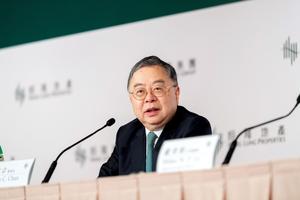 Ronnie Chan Chi-chung. (PHOTO PROVIDED TO CHINA DAILY)
Ronnie Chan Chi-chung. (PHOTO PROVIDED TO CHINA DAILY)
Developer reaping the fruits of closer mainland ties
By Oswald Chan in Hong Kong
Hang Lung Properties — one of Hong Kong’s oldest developers — boasts being one of the key beneficiaries of Hong Kong’s return 23 years ago, harvesting on the closer integration between Hong Kong and the Chinese mainland that has fueled the growth of the property sector.
“Following the reunification, Hong Kong and the mainland have forged key pacts that facilitate a heavier flow of people, goods and capital, and this bodes well for the property business,” said Hang Lung Properties Chairman Ronnie Chan Chi-chung.
The Pearl River Delta region, for instance, is one of the world’s largest global supply chain bases. The ceaseless flow of goods and services into the region will, in turn, attract professionals and capital, spurring demand for properties in Hong Kong.
“Looking ahead, the central government might come up with further measures to encourage more mainland enterprises to set up shop in Hong Kong and the city’s economy will benefit,” Chan noted.
The past 23 years have seen Hang Lung Group’s market capitalization surge from HK$19.1 billion ($2.44 billion) as of June 30, 1997 to HK$26.2 billion by Dec 31 last year — up 37 percent.
Besides dealing in residential, office and retail property in Hong Kong, Hung Lung Properties has been involved in the mainland’s property market since the 1990s, focusing on building high-end shopping malls in second-tier cities. The developer has cultivated its niche-market dominance in Shanghai, Kunming, Wuxi, Wuhan, Shenyang, Jinan, Tianjin and Dalian.
In addition to closer economic integration, the Hong Kong-listed company benefits from the mainland’s economic development that has spurred tremendous growth of the middle class.
“For nearly nine years, rental revenues from our mainland portfolios have exceeded Hong Kong’s,” Chan revealed.
As the economy falters due to weak export performance, the central government is poised to boost domestic consumption as a key economic growth driver. Expenditure on luxury homes and products on the mainland has seen a steep rebound in the past few months.
Looking ahead, Chan remains bullish about the mainland’s retail-property sector.
“Over the next three to five years, we see rapid growth for the mainland’s retail-property segment. Nowadays, mainland consumers as young as 30 years old can afford luxury items,” he noted.
Hang Lung Group’s property leasing revenue for the 2019 financial year stood at HK$9.139 billion, having soared 2.65 times since 1997. The developer’s total gross floor area of investment properties reached 60.9 million square feet — up 3.23 times, compared with 23 years ago.
During the financial year of 2019, the mainland accounted for 54 percent of the group’s property leasing revenue, whereas this market did not contribute any leasing revenue 23 years ago. The Hong Kong property leasing market accounted for the group’s entire leasing revenue in the 1996-97 financial year, but slipped to 46 percent last year.


